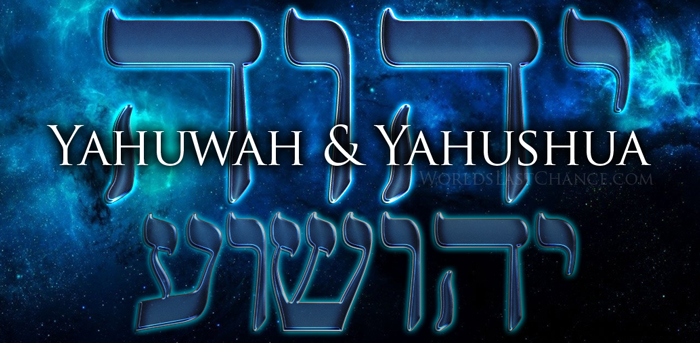

When a word is transferred from one language to another, it is either translated or transliterated. When it is translated the meaning of the word is transferred. When it is transliterated it is the sound of the word that is transferred. The transliteration of the Father’s personal name, as given in scripture, is actually YHWH, pronounced Yahuwah. The translation of this name is I Am That I Am. It implies that the One who bears the name is self-existent from eternity past to eternity future. When Moses asked how he should answer when the Israelites asked who had sent him to them, the reply was: "I AM THAT I AM . . . Thus shall you say unto the children of Israel, I AM has sent me unto you." (Exodus 3:14)
While "Jesus" is commonly used to refer to the Son, it is actually from the Greek "Iesus," which refers to the pagan god, Zeus. The name of Yahuwah’s Son is very much like His own: Yahushua. As with the Father's own personal, divine name, the importance of the Son's name is found in its definition. The beautiful meaning contained in the Saviour's name is an all-encompassing revelation of the mighty salvation offered sinners. Yahushua means:
When the angel Gabriel was sent to Mary to tell her she would bear Yahuwah’s Son, he told her what to name the Baby: "You will conceive in your womb, and bring forth a Son, and shall call His name Yahushua." (Luke 1:31) Joseph was told the same thing by the angel: "You shall call His name Yahushua for He shall save His people from their sins." (Matthew 1:21)
In Scripture, there are over 360 names or titles for the Father and the Son, from The Rose of Sharon, to The Provider. Other names applied to the Father and the Son are: The Lily of the Valley, My Shepherd, My Healer, My Banner (in War), My Guide, My Light, My Bread, My Life. Elohim, or El, means The Mighty One. In ancient times, parents would name their children under the inspiration of Yahuwah. This is seen in the many names which contain references to Yahuwah (Yah) and El.
World’s Last Chance uses Yahuwah’s and Yahushua’s true names, rather than the names and titles originally applied to pagan gods.
However, His holy name should always be used carefully and with the utmost reverence and respect. Yahuwah’s words have power! Scripture reveals that the Almighty One is so powerful that even His words are powerful enough to do what the word is. (See Isaiah 55:11.) This is why, when He created the world, all He had to do was speak: "Let there be light," and there was light! To say the very name which the Almighty Creator has given Himself is to speak a holy word that contains infinite power. When the holy angels speak His name, they cover their faces out of respect for it is holy and mighty like the One to whom it refers.
Related Content: